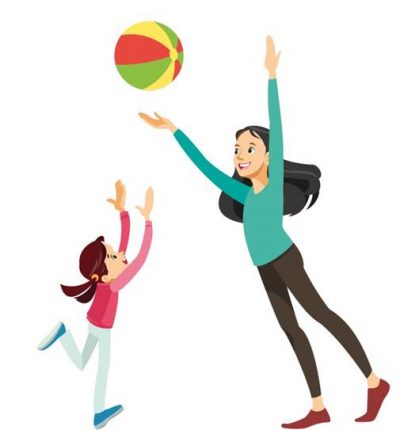As parents, we all love our children, but have you thought about whether you are expressing this love to them in a manner that they would respond to?
Quaintly dubbed as a ‘love language’, the idea behind the ways in which you show your love was sparked by a book called “The 5 Love Languages” written by Dr Gary Chapman in 1995. The book explores the premise that expressing love is not just about saying “I love you” but also includes other actions. It doesn’t mean discarding these three words completely but instead, to interact with your child depending on which of the five love languages the child is more responsive to.
‘Tak kenal maka tak cinta’ (to know somebody is to love somebody), meaning you need to know and understand your child to fully love and appreciate her.
Parental love is central to developing emotional stability, which is an essential aspect of child development, especially in the early years. This will help the child cope with life in the future. You can encourage positive emotional development by showing your child your appreciation, care and love.
Parents also need to make the effort to get to know their children. This will help you when it comes to planning out how to nurture their growth and potential. All it takes is for you to observe all the things she does. Notice how she communicates and interacts with you and the world around her. Watch how your child plays and treats her toys (e.g. dolls, stuff toys, cars, robots, etc.) – this will give you some of the clues you need! A child who feels starved of love and attention (especially if you fail to speak in her preferred love language) may display unwanted behaviour.
The five love languages
You should practise all five love languages with children below five years old, while older children would have developed their own preference towards one or two love languages. Try to accommodate your child’s preferences by using the love language she prefers.
1. Physical touch
If our children are constantly in your space (e.g. touching you, playing with your hair, taking your hands and putting on her cheek, giving hugs, etc.), it’s a sign that physical touch is her preferred method of expressing love. Thus, you should also show her your love the same way. Warm and tender physical touches can be used to express love, but you should also give equal emphasis to the other love languages.
However, it is necessary to teach our young ones on the differences between good and bad touch, to protect them from becoming victims of physical and sexual abuse. Pn Anisa Ahmad advised, “Mummy and daddy, grandmas and grandpas, uncles and aunties, even sisters and brothers, we can hug and kiss each other but there are areas where touch is improper. We need to teach our children about it. Kisses or touching on the cheek, chin, forehead or hands are fine but not on the lips, breast, buttocks, and vagina or penis.”
“Other than for washing or cleaning baby’s mess, even parents should not be touching their child’s private parts. Be upfront about this with your child and help her/him to understand that no one should be touching their private parts, and to inform adults they trust if anyone does attempt to do so.”
The President of the Association of Registered Childcare Providers Malaysia (PPBM) also advised parents to use the proper name for private parts, and avoid creative names such as flower, bird, karipap etc.
2. Giving gifts
If your child is particular about how gifts are wrapped, recalls who gave her what for years, or is reluctant to dispose gifts (even if unneeded, unused or becomes “junk” to you but remains a treasure to her), then she certainly prefers gifts to express love.
There are pros and cons to giving gifts. For one, don’t just give whatever she wants immediately whenever she asks for things. Instead, give it as a way to show her your appreciation and love, either for helping you or for being kind. This will make her value the gift more. You can also give them simple inexpensive gifts from time to time to show children that they are loved, such as clothing/accessories, flowers, her favourite food/snack, or even handmade gift or cards.
“Also, appreciate whatever your child gives you,” says Pn Anisa. “My girl gave me a card she made herself, and she was on cloud nine when I told her that I loved it. She was surprised that I still have it until today,” the mother of five shares.
It isn’t about the price tag but the effort put into it that matters. So, getting them expensive gifts doesn’t mean that your child will appreciate it more. In fact, you want to teach them the value of appreciating any gifts given to them, which is a far more important lesson for them to learn.
3. Words of affirmation
A child who favours words of affirmation as his love language tends to listen and speak intently, and loves giving or receiving praises. On this note, you should use praise to help build your child’s confidence.
Avoid giving praise for the sake of praising as it may come across as insincere. Be mindful that praise should always be sincere and specific. For instance, saying things like “You’re so smart!” or “You are a good girl!” may seem like praise but they are not specific. In order to make it effective, you can say something like “You’re so smart because you solved that puzzle without any help!” or “You’re such a good girl for keeping your promise to clean your room.”
“Give praise consistently to encourage her to form a positive belief and mindset. On the other hand, beware of hurtful words or comments because this will have a devastating effect and stay with your child for a long time,” cautions En Hairil Fadzly Md Akir.
The Deputy Director General (Policy), National Population and Family Development Board (LPPKN) also suggests an example on how to creatively praise your children: “Be generous in giving children compliments and appreciation for their appearance and good deeds or behaviour. You may also want to consider writing small encouraging notes and placing them where children will find them.”
4. Acts of service
A common sign would be a child who frequently asks you to do things for them (e.g. tying her hair or shoelaces, reading him a bedtime story, etc.). However, the downside to this type of love language is quite exhaustive and you may end up feeling like a servant, so don’t misunderstand the concept!
The main point is not for you to do everything for the child, so make it clear to her you will not be doing all her tasks as she will still need to learn how to do them herself. Of course, you can step in to help her from time to time.
It’s important to stay aware of what will be more effective, e.g. she may have a broken toy that you can help her fix or she might appreciate your help with her homework. Both provide you with the chance to turn it into a parent-child bonding activity where you spend quality time together.
En Hairil, a father of five, adds: “Simple acts of service can include making a favourite meal for your child, doing homework or chores together, building a model or even doing a puzzle together. The idea here is to not only spend time together but to also do things with, and for them. They’ll notice your love and the time you spend will endear you to them.”
5. Spending quality time
It isn’t difficult to identify this love language as your child will often ask you to watch him doing things or demand that you play with her. You can spend quality time with her by reading together, going on walks in the park and interacting closely with her.
This is pretty much the bread-and-butter of any parent-child bond, regardless of whether you subscribe to the theory of the five languages of love or not. Unfortunately, many modern parents are finding it increasingly difficult to spend quality time with their kids.
Datuk Dr Zulkifli Ismail suggests: “Start by scheduling time for activities to be done together. Talk with your child to see what she prefers. If she loves singing, you can play her favourite song and sing-along together. You can also introduce activities such as rock climbing or badminton. Take turns to select the activities you’ll do together to keep things interesting and fun.”
The Chairman of the Positive Parenting Programme reminds: “Whatever the activity is, the important thing is to be ‘present’ and to fully focus your attention on her. Keep digital gadgets aside, otherwise you may be distracted and send her the message that your gadget is more important than her.”
It’s all about connecting
At the end of the day, it’s all about using your child’s preferred language of love. Foster a close bond as early as possible – the longer you wait, the harder it becomes to have a close parent-child bond. This is more so when your child reaches her teen years or starts becoming more rebellious because of a lack of connection.
It’s important to communicate with each other about one’s preferred love languages, so talk directly with each other about your preferences. Your child’s preference will change as she grows and matures, so you will need to keep up to date with your approach in showing parental love. Stay observant to see how receptive she is to the language of love that you are using. For instance, your toddler may love goodbye hugs when you drop her off at daycare, but your teen may find it awkward or embarrassing if you do the same when dropping her off at school.
Remember to make allowances for her as she still needs your guidance. The ultimate aim is that parents can communicate with the child based on her love language, and vice-versa.











Comments